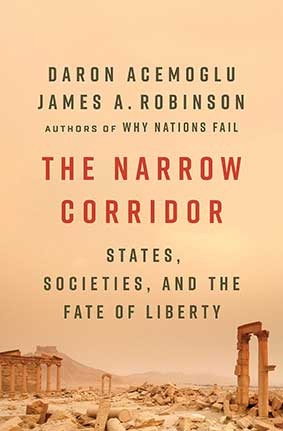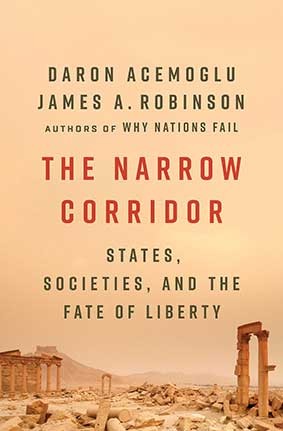The fragility of freedom
Daron Acemoglu and James A. Robinson examine the messy, uncertain process that gives rise to political liberty.



Why do some states have democratic forms of government and substantial protections for personal liberty when others are repressive and dictatorial? Many grand theories have emphasized one specific factor or another, including culture, climate, geography, technology, or the development of a robust middle class.
In The Narrow Corridor, economist Daron Acemoglu and his longtime collaborator James A. Robinson, a political scientist at the University of Chicago, promote a different view: political liberty comes from social struggle.
We have no universal template for liberty, says Acemoglu, an Institute Professor at MIT: “True democracy and liberty don’t originate from checks and balances or from clever institutional design. They originate [and are sustained] in the much more messy process of society mobilizing, people defending their own liberties and actively setting constraints on how rules and behaviors are imposed on them.”
Drawing on examples dating to ancient times, Acemoglu and Robinson explain that state power is necessary to protect people from domination at the hands of others in society, but that the state can also become an instrument of violence and repression. When social groups contest this power, the resulting conflict “creates a narrow corridor in which liberty flourishes,” Acemoglu says. “You need this conflict to be balanced. An imbalance is detrimental to liberty. If society is too weak, that leads to despotism. But on the other side, if society is too strong, that results in weak states that are unable to protect their citizens.”
It’s difficult to achieve and maintain this balance, which means that liberty is contingent and fragile. Contrary to theories that emerged in the wake of World War II and the Cold War, “there is no ineluctable process that’s going to take every country smoothly toward some sort of liberty,” Acemoglu says. But if liberty can’t be guaranteed, it also isn’t necessarily restricted by factors such as geography or culture: “Ours is a view that emphasizes the role of agency by individuals and society, and maintains that different social organizations lead to different outcomes.”
US history offers some illustrations. The Constitution, Acemoglu and Robinson write, was a “Faustian bargain” to limit both government and popular power, but its emphasis on states’ rights failed to protect African-Americans from “violence, discrimination, poverty, and dominance.” The freedoms that many citizens enjoy today owe at least as much to the civil rights movement, the women’s movement, and other examples of popular mobilization as to “the brilliant design of the Constitution.”
Acemoglu says the book is also deeply relevant to current discussions about the future of governance and democracy. “Creating the right sort of political balance, and mobilizing society while not disempowering laws and institutions, are completely first-order challenges we face today,” he says. “I hope our perspective will shed some light on those issues.”